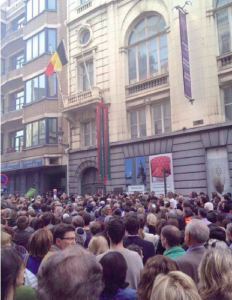NEWS Building a Future for Jews in Belgium
Serge Rozen was elected, with 92% of the votes, as the new president of the Comité de coordination des organisations juives de Belgique (Coordination Committee of Belgian Jewish Organizations). The CCOJB is the leading Jewish umbrella organization in Belgium and the Belgian affiliate of the European Jewish Congress and the World Jewish Congress. Rozen succeeded Maurice Sosnowski, who had been in charge of the organization for the past five years. He is a 62 years old engineer and was elected at the beginning of March. Rozen has been active in the world of Jewish organizations for much longer. In fact he had been the president of the Haim Foundation, which finances Jewish associations and organizations in Brussels for 15 years. “This position – he told Pagine Ebraiche – gave me the possibility to get in touch with this world, to meet many people and to gain experience. This is how I know how difficult the situation is becoming.”
Mr. Rozen, was this the reason why you chose to present yourself to become president of the CCOJB?
The Jewish minority in Belgium is very small and on a politician’s agenda its’ issues can become negligible. If the Jewish minority is not able to assert its’ rights, there is a serious risk that they might not be taken into consideration. Therefore, I realized how fundamental it is to pursue a constant dialogue with political authorities.
What are the priorities when it comes to such dialogue?
First of all security, and then obviously the fight against anti-Semitism. My feeling is that the phenomenon of anti-Semitism has been dealt with too weakly, and now we have passed the limit. But the more you let a situation degenerate the harder it is to regain control of it. It is thus necessary to fully apply all the laws, which already exist in Belgium. And after that it is also indispensable to work on the educational side, especially among the young in general and even more among young Muslims. This has also been too often neglected in the past few years.
What is the atmosphere in Belgium like now after the terrorist attack against the Jewish Museum of Brussels and the recent events in Paris?
It is human nature to be less frightened as time passes. But certainly the atmosphere is still very tense. The presence of armed soldiers in front of Jewish – and not only Jewish – sites affects the spirit. Terrorism is a heavy threat and many people are starting to think that Belgium might not be the right place to live, as the rise of alyiah proves.
Speaking of which, what do you think about Netanyahu’s invitation to European Jews to move to Israel after the Paris attacks?
Jews should always feel attracted by the idea of moving to Israel, and it is Netanyahu’s duty as prime minister to make them always feel welcome. Nevertheless, it was not his place to make such an invitation at the very moment they felt most threatened for their safety. I believe that he did this also for his electoral campaign. It is the State’s task to protect the Jews and they should never think of being safer somewhere else. One can leave to follow an ideal or even to look for a better economic future, but fear is unacceptable as a reason.
Recently, there were some clashes at the Université Libre de Bruxelles (ULB) between some demonstrators for the BDS movement (Boycott, Disinvestment, Sanctions), that calls to boycott Israeli products, and a few students belonging to the Union des Étudiants Juifs de Belgique (Belgian Union of Jewish Students). What measures have to be taken regarding the rise of anti-Semitism on university campuses?
I spoke with ULB’s management and I was told that anti-Semitic actions or speech is not permitted. Nevertheless, students and parents are afraid. Clearly there is an overlap between the concepts of anti-Zionism and anti-Semitism. In theory, their meaning is different, but there has been a drift that changed the sense of the words. What happened at ULB proved that people are stigmatized for what they are and not for the ideas they have, and this is a definition of anti-Semitism.
In the wake of Israeli political elections, which confirmed Netanyahu’s leadership, do you think anything will change?
In western countries, Netanyahu is perceived as incapable of carrying on relations with the Palestinians. In Israel instead, they see him as the only political leader that can grant security. Israelis feel threatened, they are afraid and therefore they vote him. European countries thus need to try to reassure Israel by showing it their support.
Speaking of interfaith dialogue, what do you think should be done by Jewish Communities?
The rate of immigration is very high in Belgium. Today’s society is therefore strongly multicultural. Certainly, there has to be a desire to want to live together while respecting the State laws. However, for reasons that I do not know, the Muslim Community seems unwilling to integrate and their religious laws have overcome State laws. I do believe that this also played a role in the relations with the Jewish Community, as well as for the difficulties in the dialogue about the Middle East conflict, which could contribute to exacerbating them.

